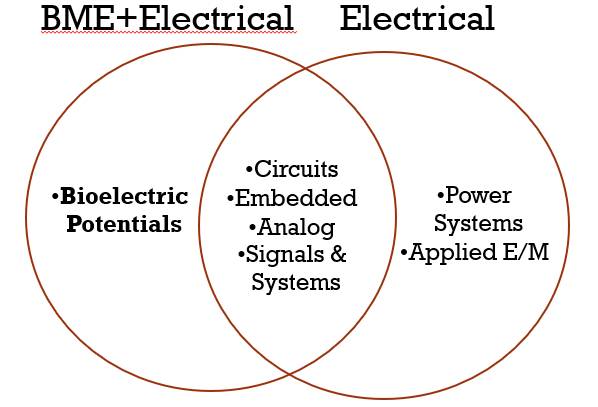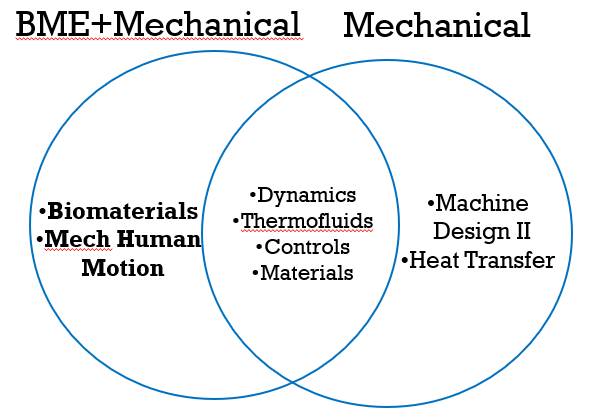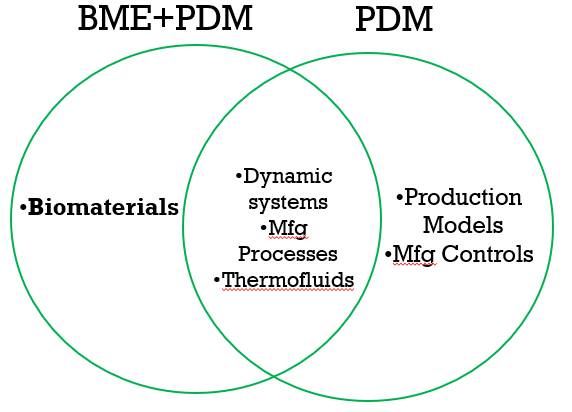Undergraduate Biomedical Engineering Major
Biomedical engineering students must complete all requirements for the B.S.E. degree including the general education and basic skills requirements, the foundations of engineering courses, cooperative education, the engineering design capstone, and the following required courses.
Required Courses
All Biomedical Engineering students must take the following required courses:
- BMS 202 - Anatomy and Physiology (Credits: 4)
- CHM 230 - Introduction to Organic and Biochemistry (Credits: 4)
- EGR 403 - Medical Device Design (Credits: 3)
- EGR 435 - Mathematical Modeling of Physiological Systems (Credits: 3)
Emphasis Requirement
Students must also complete an emphasis in electrical, mechanical, or product design and manufacturing. See below for requirements specific to each emphasis.
Electrical Emphasis
Students choosing the electrical emphasis should complete the foundations course for the Electrical Engineering major.

Venn Diagram explaining the differences and similarities between the GVSU Biomedical Engineering major with an Electrical emphasis and the GVSU Electrical Engineering major.
Required content in the Biomedical Engineering major with Electrical emphasis: bioelectric potentials.
Required content in both the Biomedical Engineering major with Electrical emphasis and the Electrical Engineering major: circuits, embedded, analog, signals and systems.
Required content in the Electrical Engineering major: power systems and applied E/M.
Required Courses in Electrical Emphasis
- EGR 314 - Circuit Analysis II (Credits: 4)
- EGR 315 - Electronic Circuits I (Credits: 4)
- EGR 323 - Signals and Systems Analysis (Credits: 3)
- EGR 326 - Embedded System Design (Credits: 4)
- EGR 434 - Bioelectric Potentials (Credits: 3)
Elective Courses in Electrical Emphasis
Select 2 courses from the following:
- EGR 432 – Biomedical Imaging and Image Processing (Credits: 3)
- EGR 433 – Electronic Instrumentation for Biomedical Applications (Credits: 3)
- EGR 343 – Applied Electromagnetics (Credits: 4)
- EGR 415 – Communication Systems (Credits: 4)
- EGR 418 – Radio Frequency Systems (Credits: 4)
- EGR 423 – Digital Signal Processing Systems (Credits: 4)
- EGR 424 – Design of Microcontroller Applications (Credits: 4)
- EGR 426 – Integrated Circuit Systems Design (Credits: 4)
- EGR 436 – Embedded Systems Interface (Credits: 4)
- EGR 443 – Electromagnetic Compatibility (Credits: 4)
- EGR 455 – Automatic Control (Credits: 4)
- EGR 458 – Introduction to Fiber Optics (Credits: 4)
- EGR 457 – Fundamentals of Nanotechnology (Credits: 4)
Mechanical Emphasis
Students choosing the mechanical emphasis should complete the foundations course for the Mechanical Engineering major.

Venn Diagram explaining the differences and similarities between the GVSU Biomedical Engineering major with a Mechanical emphasis and the GVSU Mechanical Engineering major.
Required content in the Biomedical Engineering major with Mechanical emphasis: biomaterials, mechanics of human motion.
Required content in both the Biomedical Engineering major with Mechanical emphasis and the Mechanical Engineering major: dynamics, thermofluids, controls, materials.
Required content in the Mechanical Engineering major: machine design II, heat transfer.
Required Courses in Mechanical Emphasis
- EGR 250 - Materials Science and Engineering (Credits: 4)
- EGR 346 - Mechatronic Systems Dynamics and Control (Credits: 4)
- EGR 362 - Thermal and Fluid Systems (Credits: 3)
- EGR 447 - Mechanics of Human Motion (Credits: 3)
- EGR 453 - Biomedical Materials (Credits: 3)
Elective Courses in Mechanical Emphasis
Select 2 courses from the following:
- EGR 311 – Intermediate Computer Aided Design and Manufacturing (Credits: 3)
- EGR 329 – Introduction to Finite Element Analysis (Credits: 3)
- EGR 350 – Vibration (Credits: 4)
- EGR 352 – Kinematics and Dynamics of Machinery (Credits: 4)
- EGR 367/368 – Manufacturing Processes with Laboratory (Credits: 4)
- EGR 405 – Materials Failure Analysis and Selection (Credits: 3)
- EGR 409 – Machine Design II (Credits: 4)
- EGR 445 – Robotics Systems Engineering (Credits: 4)
- EGR 450 – Manufacturing Control Systems (Credits: 4)
- EGR 465 – Computational Fluid Dynamics (Credits: 4)
- EGR 468 – Heat Transfer (Credits: 4)
Product Design and Manufacturing (PDM) Emphasis
Students choosing the product design and manufacturing emphasis should complete the foundations course for the Product Design and Manufacturing Engineering major.

Venn Diagram explaining the differences and similarities between the GVSU Biomedical Engineering major with a Product Design and Manufacturing emphasis and the GVSU Product Design and Manufacturing Engineering major.
Required content in the Biomedical Engineering major with Product Design and Manufacturing emphasis: biomaterials.
Required content in both the Biomedical Engineering major with Product Design and Manufacturing emphasis and the Product Design and Manufacturing Engineering major: dynamic systems, manufacturing processes, thermofluids.
Required content in the Product Design and Manufacturing Engineering major: production models, manufacturing controls.
Required Courses in PDM Emphasis
- EGR 301 - Analytical Tools for Product Design (Credits: 4)
- EGR 345 - Dynamic System Modeling and Control (Credits: 4)
- EGR 362 - Thermal and Fluid Systems (Credits: 4)
- EGR 367 - Manufacturing Processes (Credits: 4)
- EGR 453 - Biomedical Materials (Credits: 3)
Elective Courses in PDM Emphasis
Select 2 courses from the following:
- EGR 311 – Intermediate Computer Aided Design and Manufacturing (Credits: 3)
- EGR 404 – Polymer Science and Processing (Credits: 4)
- EGR 405 – Materials Failure Analysis and Selection (Credits: 3)
- EGR 409 – Machine Design II (Credits: 4)
- EGR 440 – Introduction to Production (Credits: 3)
- EGR 441 – Engineering Economics, Quality Control, and Manufacturing Operations (Credits: 4)
- EGR 445 – Robotics Systems Engineering (Credits: 4)
- EGR 447 – Engineering Mechanics of Human Motion (Credits: 3)
- EGR 450 – Manufacturing Control Systems (Credits: 4)
- EGR 465 – Computational Fluid Dynamics (Credits: 4)
Visit the PCE Advising Center for detailed program plans.

